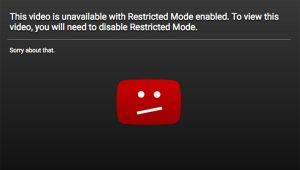Currently both Facebook and Google are revamping their online platforms with the ability to censor unwanted controversial online material on the internet as well as already blocking certain online material which would be considered hateful and extremist in nature. With google’s youtube now introducing a self censoring online material censor called “Restricted mode” which is supposed to block unwanted content. However I believe that both Facebook and Google will need to carefully consider and weight the interests of all of their stakeholder’s including their advertisers, online publishers and viewers, so as to ensure there is good stakeholder balance in accordance with Freeman’s Stakeholder Theory before making any decisions with regards to selective censorship of online material.

According to two guardian articles, both Facebook and Google are having a fairly difficult time implementing these automated anti-hate speech online content censors, due to the tediousness of scanning every video or post for potential content which is, hateful, contentious, controversial or extremist in nature (Hern)(Salon). So far both have only used automated artificial intelligence to scan for key words to block certain posts from being published, this has caused a backlash due to some posts being unjustly blocked, since sometimes key words can be deceiving and not reflect the true message of the post. Furthermore it is sometimes not so clear cut in being able to definitively determine what material is too controversial or contentious to be online, so long as the online material is not promoting terrorism or violence since there are a labyrinth of so many competing and different perspectives on a variety of contentious issues. For instance while fairly extreme left and right wing political websites may be undesirable to some portions of society, so long as they are not inciting violence it is difficult to subjectively come up with a definitive definition of what is acceptable and what is not. Therefore rejecting posts in an unregulated manner according to keywords left, right and centre without a proper vetting procedure may actually have the counter-intuitive effect of giving smaller, more extreme minded segments of society more propaganda power to attract more followers by portraying themselves as heroes fighting an unjust censorship system.

Overall, I believe that Facebook and Google must develop a suitable vetting procedure to scan videos for over the top extremist ideology, hate speech and promotion of violence before beginning to selectively censor online content or pull advertising from these perceived undesirable videos without a proper vetting procedure. Obviously for easy to spot extremist content like ISIS beheading videos this is an easy task. However vetting videos for undesirable content on a large scale with 300 hours of video being uploaded every minute to Youtube is a difficult task. (Hern)

Word Count (not counting in-text citations)= 449 words
References:
-Hern, A. (2017, March 21). To censor or not to censor? YouTubes double bind. Retrieved November 9, 2017, from https://www.theguardian.com/technology/2017/mar/21/youtube-advertisers-censorship
-Salon, O. (2017, May 23). To censor or sanction extreme content? Either way, Facebook can’t win. Retrieved November 8, 2017, from https://www.theguardian.com/news/2017/may/22/facebook-moderator-guidelines-extreme-content-analysis
Key:
(xxx) indicates an in-text citation